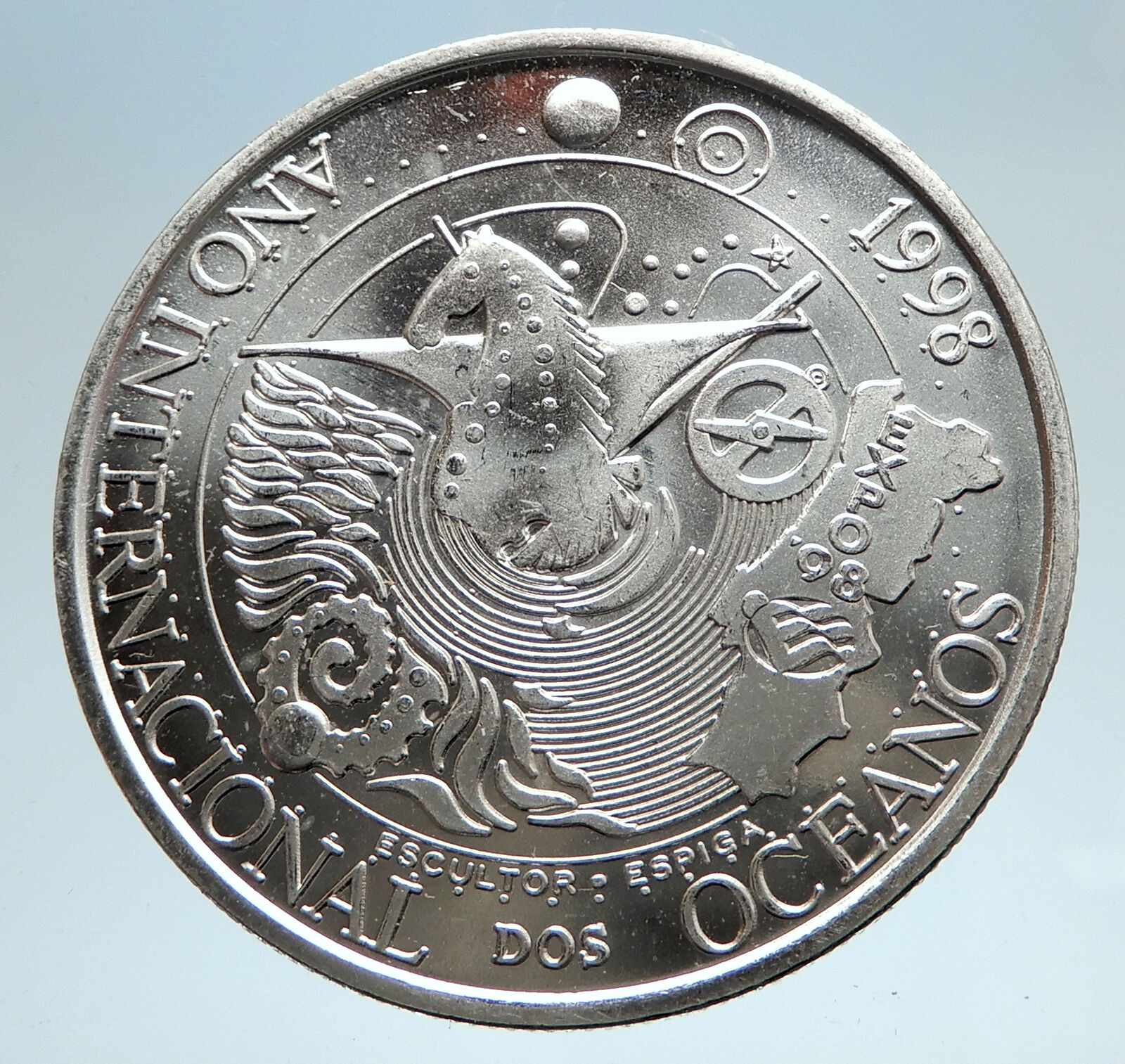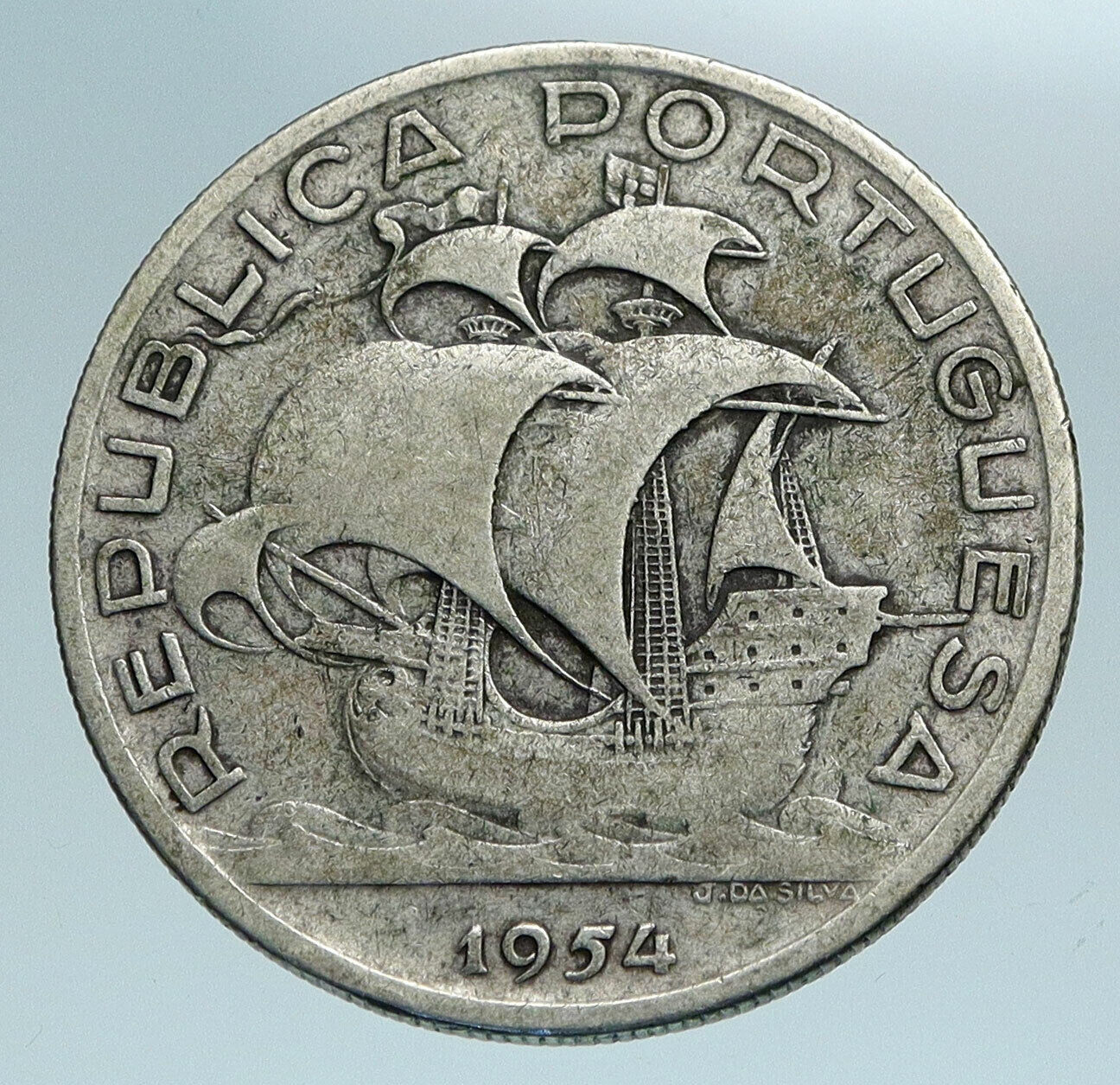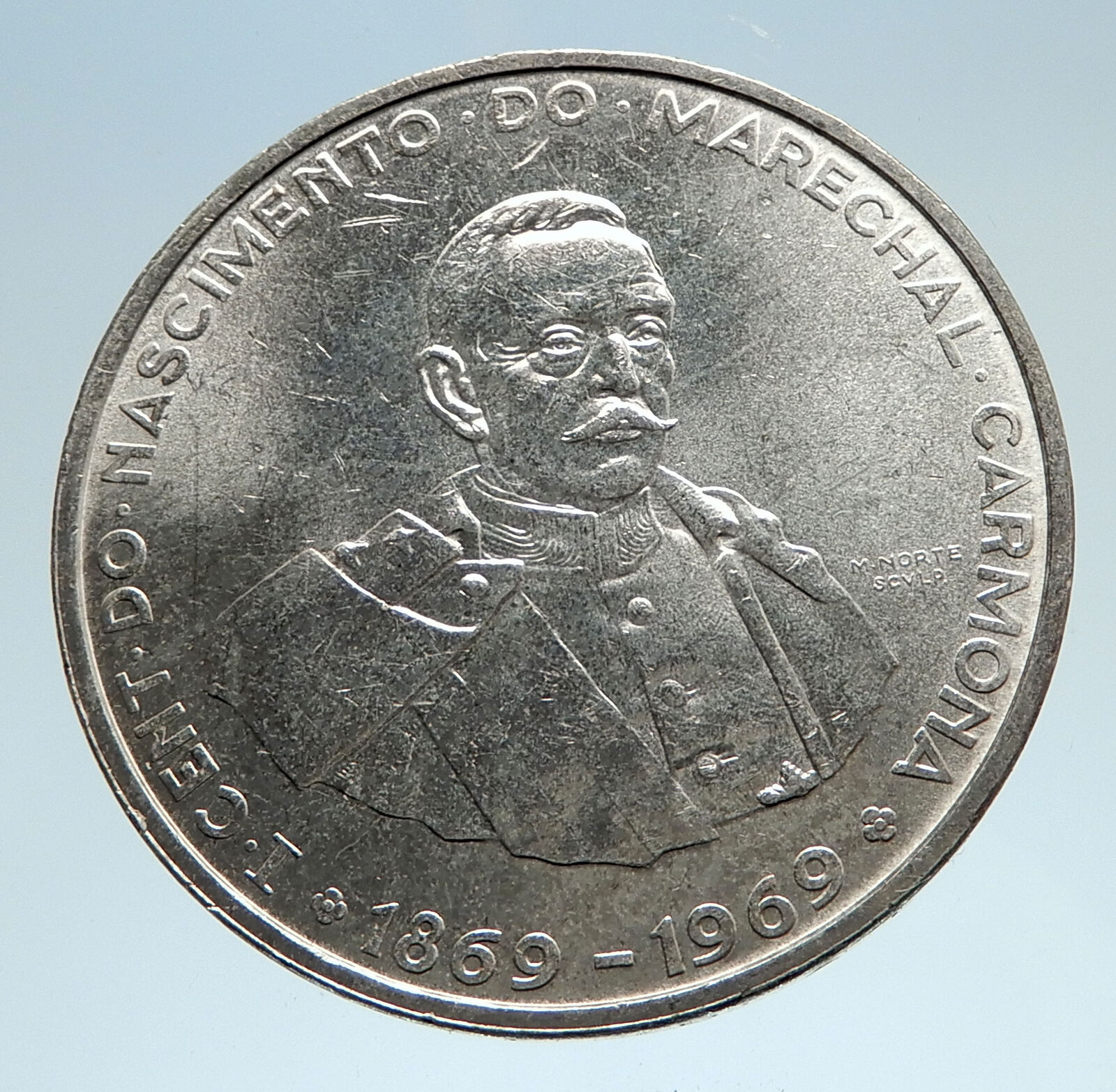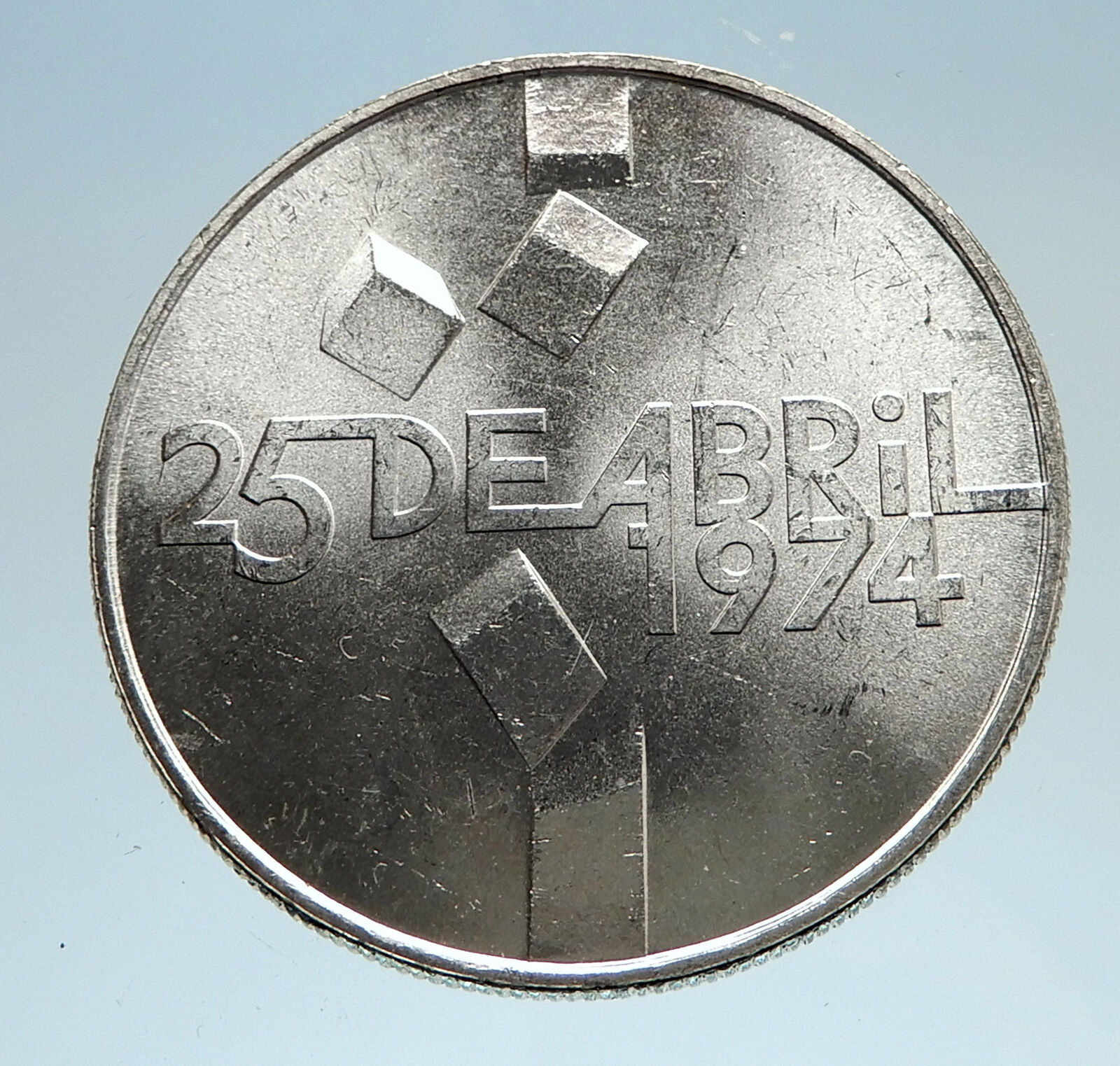|
Portugal
Frigates: Fragata D.Fernando II and Gloria
1996 Silver 1000 Escudos 40mm (28.00 grams) 0.500 Silver (0.4501 oz. ASW)
Reference: KM# 688, Gomes# R 158.01 | Engraver: S. Machado
REPUBLICA PORTUGUESA 1000 ESCUDOS S.MACHADO, Shield, figurehead, ship’s hull.
FRAGATA D.FERNANDO II E GLORIA DAMÃO – 1843 – 1996 – AVEIRO, Ship below two facing busts.
You are bidding on the exact item pictured, provided with a Certificate of Authenticity and Lifetime Guarantee of Authenticity.
 Dom Fernando II e Glória is a wooden-hulled, 50-gun frigate of the Portuguese Navy. She was launched in 1843 and made her maiden voyage in 1845. Built at the shipyard of Daman in Portuguese India, it was Portugal’s last sailing warship to be built and also the last ship that undertook the Carreira da Índia (India Run), a regular military line that connected Portugal to its colonies in India since the beginning of the 16th century. Dom Fernando II e Glória is a wooden-hulled, 50-gun frigate of the Portuguese Navy. She was launched in 1843 and made her maiden voyage in 1845. Built at the shipyard of Daman in Portuguese India, it was Portugal’s last sailing warship to be built and also the last ship that undertook the Carreira da Índia (India Run), a regular military line that connected Portugal to its colonies in India since the beginning of the 16th century.
The ship remained in active service until 1878, when she made her last sea voyage, having travelled more than one hundred thousand miles, the equivalent of five circumnavigations of the world.
After long service it was almost destroyed by a fire in 1963 with the burned wooden-hull remaining beached at the mud-flats of the river Tagus for the next 29 years. Finally in 1990 the Portuguese Navy decided to restore her to her appearance in the 1850s. During the World Exhibition of 1998 the ship remained in Lisbon as a museum ship on the dependency of the Navy Museum, being classified as an Auxiliary Navy Unit (UAM 203). Since 2008, the ship lies on the southern margin of the Tagus river in Cacilhas, Almada.
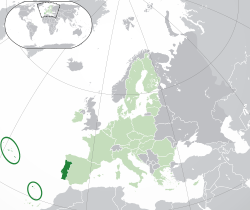  Portugal, officially the Portuguese Republic (Portuguese: República Portuguesa), is a country on the Iberian Peninsula, in Southwestern Europe. It is the westernmost country of mainland Europe, being bordered by the Atlantic Ocean to the west and south and by Spain to the north and east. The Portugal-Spain border is 1,214 km (754 mi) long and considered the longest uninterrupted border within the European Union. The republic also includes the Atlantic archipelagos of the Azores and Madeira, both autonomous regions with their own regional governments. Portugal, officially the Portuguese Republic (Portuguese: República Portuguesa), is a country on the Iberian Peninsula, in Southwestern Europe. It is the westernmost country of mainland Europe, being bordered by the Atlantic Ocean to the west and south and by Spain to the north and east. The Portugal-Spain border is 1,214 km (754 mi) long and considered the longest uninterrupted border within the European Union. The republic also includes the Atlantic archipelagos of the Azores and Madeira, both autonomous regions with their own regional governments.
 The territory of modern Portugal has been continuously settled, invaded and fought over since prehistoric times. The Pre-Celts, Celts, Phoenicians, Carthaginians and the Romans were followed by the invasions of the Visigothic and the Suebi Germanic peoples, who were themselves later invaded by the Moors. These Muslim peoples were eventually expelled during the Christian Reconquista. Portuguese nationality can be traced back to the creation of the First County of Portugal, in 868. In 1139, Afonso Henriques was proclaimed King of Portugal, thus firmly establishing Portuguese independence, under the Portuguese House of Burgundy. The territory of modern Portugal has been continuously settled, invaded and fought over since prehistoric times. The Pre-Celts, Celts, Phoenicians, Carthaginians and the Romans were followed by the invasions of the Visigothic and the Suebi Germanic peoples, who were themselves later invaded by the Moors. These Muslim peoples were eventually expelled during the Christian Reconquista. Portuguese nationality can be traced back to the creation of the First County of Portugal, in 868. In 1139, Afonso Henriques was proclaimed King of Portugal, thus firmly establishing Portuguese independence, under the Portuguese House of Burgundy.
In the 15th and 16th centuries, under the House of Aviz, which took power following the 1383-85 Crisis, Portugal expanded Western influence and established the first global empire, becoming one of the world’s major economic, political and military powers. During this time, Portuguese explorers pioneered maritime exploration in the Age of Discovery, notably under royal patronage of Prince Henry the Navigator and King João II, with such notable discoveries as Vasco da Gama’s sea route to India (1497-98), Pedro Álvares Cabral’s discovery of Brazil (1500), and Bartolomeu Dias’s reaching of the Cape of Good Hope. Portugal monopolized the spice trade during this time, under royal command of the Casa da Índia, and the Portuguese Empire expanded with military campaigns led in Asia, notably under Afonso de Albuquerque, who was known as the “Caesar of the East”.
The destruction of Lisbon in a 1755 earthquake, the country’s occupation during the Napoleonic Wars, the independence of Brazil (1822), and the Liberal Wars (1828-1834), all left Portugal crippled from war and diminished in its world power. After the 1910 revolution deposed the monarchy, the democratic but unstable Portuguese First Republic was established, later being superseded by the “Estado Novo” right-wing authoritarian regime. Democracy was restored after the Portuguese Colonial War and the Carnation Revolution in 1974. Shortly after, independence was granted to all its colonies and East Timor, with the exception of Macau, which was handed over to China in 1999. This marked the end of the longest-lived European colonial empire, leaving a profound cultural and architectural influence across the globe and a legacy of over 250 million Portuguese speakers today.
Portugal is a developed country with a high-income advanced economy and high living standards. It is the 5th most peaceful country in the world, maintaining a unitary semi-presidential republican form of government. It has the 18th highest Social Progress in the world, putting it ahead of other Western European countries like France, Spain and Italy. It is a member of numerous international organizations, including the United Nations, the European Union, the eurozone, OECD, NATO and the Community of Portuguese Language Countries. Portugal is also known for having decriminalized the usage of all common drugs in 2001, the first country in the world to do so. However, the sale and distribution of these drugs is still illegal in Portugal.
|





 Dom Fernando II e Glória is a wooden-hulled, 50-gun frigate of the Portuguese Navy. She was launched in 1843 and made her maiden voyage in 1845. Built at the shipyard of Daman in Portuguese India, it was Portugal’s last sailing warship to be built and also the last ship that undertook the Carreira da Índia (India Run), a regular military line that connected Portugal to its colonies in India since the beginning of the 16th century.
Dom Fernando II e Glória is a wooden-hulled, 50-gun frigate of the Portuguese Navy. She was launched in 1843 and made her maiden voyage in 1845. Built at the shipyard of Daman in Portuguese India, it was Portugal’s last sailing warship to be built and also the last ship that undertook the Carreira da Índia (India Run), a regular military line that connected Portugal to its colonies in India since the beginning of the 16th century.
 Portugal, officially the Portuguese Republic (Portuguese: República Portuguesa), is a country on the Iberian Peninsula, in Southwestern Europe. It is the westernmost country of mainland Europe, being bordered by the Atlantic Ocean to the west and south and by Spain to the north and east. The Portugal-Spain border is 1,214 km (754 mi) long and considered the longest uninterrupted border within the European Union. The republic also includes the Atlantic archipelagos of the Azores and Madeira, both autonomous regions with their own regional governments.
Portugal, officially the Portuguese Republic (Portuguese: República Portuguesa), is a country on the Iberian Peninsula, in Southwestern Europe. It is the westernmost country of mainland Europe, being bordered by the Atlantic Ocean to the west and south and by Spain to the north and east. The Portugal-Spain border is 1,214 km (754 mi) long and considered the longest uninterrupted border within the European Union. The republic also includes the Atlantic archipelagos of the Azores and Madeira, both autonomous regions with their own regional governments. The territory of modern Portugal has been continuously settled, invaded and fought over since prehistoric times. The Pre-Celts, Celts, Phoenicians, Carthaginians and the Romans were followed by the invasions of the Visigothic and the Suebi Germanic peoples, who were themselves later invaded by the Moors. These Muslim peoples were eventually expelled during the Christian Reconquista. Portuguese nationality can be traced back to the creation of the First County of Portugal, in 868. In 1139, Afonso Henriques was proclaimed King of Portugal, thus firmly establishing Portuguese independence, under the Portuguese House of Burgundy.
The territory of modern Portugal has been continuously settled, invaded and fought over since prehistoric times. The Pre-Celts, Celts, Phoenicians, Carthaginians and the Romans were followed by the invasions of the Visigothic and the Suebi Germanic peoples, who were themselves later invaded by the Moors. These Muslim peoples were eventually expelled during the Christian Reconquista. Portuguese nationality can be traced back to the creation of the First County of Portugal, in 868. In 1139, Afonso Henriques was proclaimed King of Portugal, thus firmly establishing Portuguese independence, under the Portuguese House of Burgundy.

